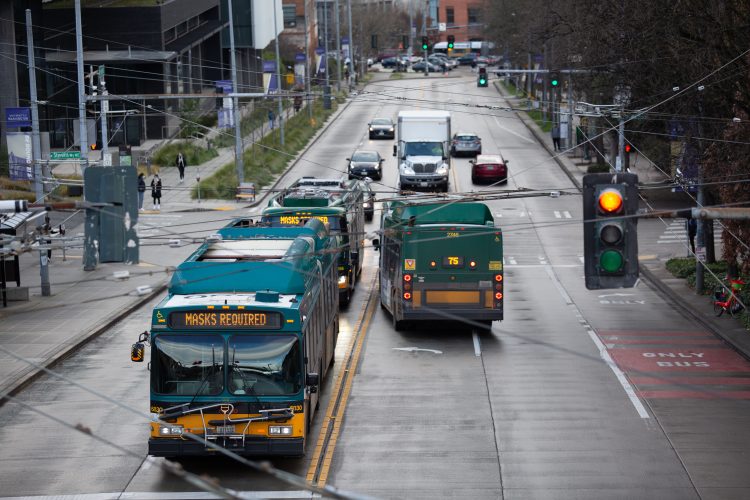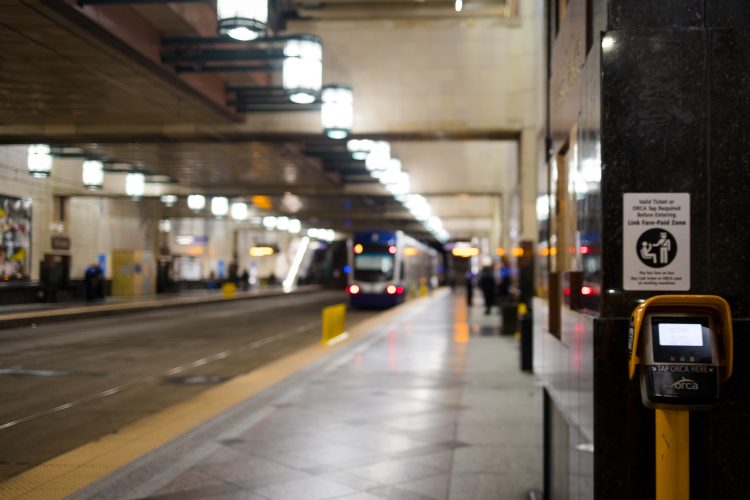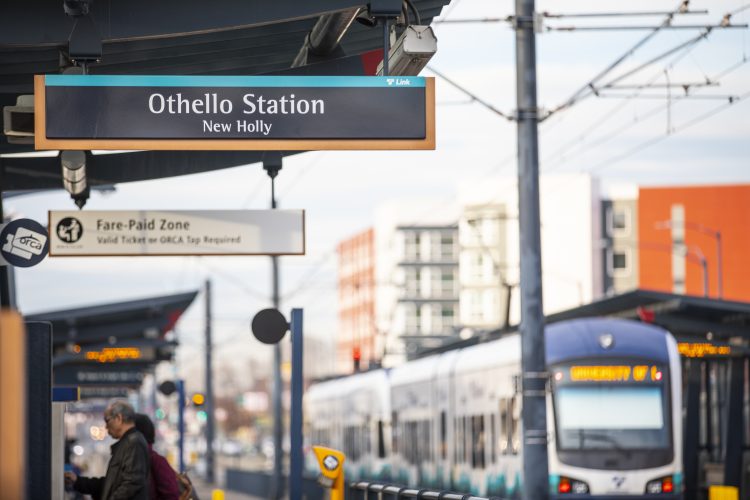February 10, 2022
The need for more equitable fare enforcement: An examination by Isis Moon Gamble, recent graduate of CBE’s Master of Urban Planning program
Though Transit Equity Day is just one day, the issue of equity on Seattle’s public transit is an ongoing and important conversation to Seattle and King County residents. Neighborhoods across the county have unequal access to transit lines; bus stops are often located in inconvenient or dangerous places due to oncoming traffic and lack of sidewalks; and bus schedules are irregular or sparse, with long wait times. These are just a few of the challenges folks might experience before getting on the bus.
Master of Urban Planning Graduate, Isis Moon Gamble, dove into equity and access within the King County transit system in her thesis research, and we sat down with her to learn more.
In 2019 when Gamble started her research, she realized there had been no analysis done on the relationship between race and fare enforcement on King County Metro (KCM) RapidRide buses. While this analysis existed for houseless and housing unstable riders, there was a lack of analysis regarding race.
Gamble had originally been interested in affordable housing, but her internship with the Seattle Housing Authority (SHA) pushed her to explore the connection between housing and transit access more deeply. While at the SHA, she worked on the ORCA Opportunity Project, an ORCA card for people who were Seattle Housing Authority residents making less than 30% of the average median income. As a pilot, the project gave out 1500 free and unlimited use ORCA cards for a year.

King County Metro buses
Gamble worked most closely with people living in SHA buildings, a majority being very low income, immigrants, and/or people of color. She asked these residents questions such as, how many times a week do you ride the bus? What do you feel you can’t access? And what expenses have you had to forgo to pay for the bus?
“We don’t see public transportation as a public good, but we should.” – Isis Moon Gamble
Gamble often heard that people had negative interactions during their bus riding experience in general, with fare enforcement officers as well as bus drivers and riders. She heard mixed responses about experiences on the bus: some people felt unsafe, while some people did feel safe. However, the negative experiences seemed to consistently relate both to the bus being unaffordable, and the feeling that they weren’t welcome in that space due to their identities as unhoused people.
Understanding biased policing on houseless riders
As part of her masters research, Gamble took a look at what our region’s transportation agencies were doing to address the inequities in fare enforcement policies. In 2019, both Sound Transit and King County Metro constructed working groups to analyze fare enforcement policies.
Because riders entering Sound Transit’s Link light rail or KCM’s RapidRide do not pass through any turnstiles or have to present tickets before boarding, fare enforcement officers enter the Link and RapidRide buses to check proof of payment.
Gamble shares, “To ensure that public transit services in King County are operating in a ‘fair’ way that avoids potential profiling, enforcement officers are expected to make random checks of transit riders. However, in a 2019 assessment, King County Metro auditors found that the deployment of fare enforcement officers is not random and that instead they are typically deployed to areas where more fare evasion has been recorded in the past.”

Westlake Center light rail station
Analysis by the King County Metro (KCM) auditors revealed that most of the tickets they were giving out were to people that were houseless or housing unstable, and/or with very low incomes.
Between 2015 and 2017, approximately 25% of citations and 30% of misdemeanors were imposed on those who were likely houseless or housing instable (Auditors Report, 2018).
In Gamble’s assessment, the data collected on housing status itself seemed ripe for potential bias: “much of this data came from an officer’s observation on ‘whether or not a person looked housing insecure’ or if that person volunteered their housing situation.”
Added bias: disproportionate fare enforcement toward Black riders
As Gamble continued her analysis, she found other disparities. As many in the U.S. have become more aware of the extreme and disproportionate policing that Black and Brown people face in all areas of our society, Gamble’s subsequent research showed that this extends to fare enforcement on public transit. Gamble’s thesis highlighted disproportionate fare enforcement and policing of people of color, and more specifically, Black riders.
Ridership data for the Link light rail shows that while only 9% of riders identify as Black, these riders received 43% of tickets and 57% of misdemeanor charges between 2015 and 2019. Gamble found that the severity of charges increased for Black riders as well: while white riders received the most warnings, Black riders were more likely to be given a monetary charge.
Sound Transit has made policy changes to reduce inequities in fare enforcement since 2019: they have reduced the citation fee from $124 to $50, and if paid within 30 days, the ticket is further reduced to $25. KCM has also made similar policy changes both in 2019 and 2020, including moving its fare evasion process in-house rather than through the criminal justice system, and providing other options in place of paying the penalty fine. Gamble is concerned that issuing these other options is still at the discretion of enforcement officers.

Othello light rail station
She also noted that while policy changes now prohibit misdemeanor charges for fare evasion, someone could get a misdemeanor for refusing to get off the bus or making a scene. She says that this can often become an issue of mental health, or of officer interpretation regarding what constitutes “making a scene.”
“People are still having negative interactions with fare enforcement.” – Isis Moon Gamble
Gamble believes that to make greater progress, KCM could address policing practices and provide implicit bias training
Regional shifts toward equitable fare enforcement
Last year, HB 1301 passed and was signed into law, allowing transit agencies to establish their own methods of fare engagement and enforcement. Importantly, before the passing of this bill, Sound Transit was required by state law to issue civil infractions for fare non-payment, which could have resulted in going to court. Now, Sound Transit can reform its fare enforcement program–divorcing from the court system and creating alternative resolutions. KCM has been undertaking the SaFE Reform Initiative that also may address fare enforcement inequities; they are entering the implementation phase of this initiative.
“Public transportation won’t be an equitable system until everybody can access it. As long as you have a fee, no matter how cheap that fee is, it’s going to lead to inequitable outcomes.” – Isis Moon Gamble
The City of Olympia, in a related move, recently made a shift to a fare-free transit system.
Gamble believes King County could make the same change.
Want to read Gamble’s full thesis? Reach out to her via email.
